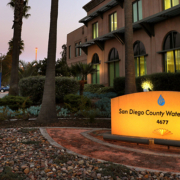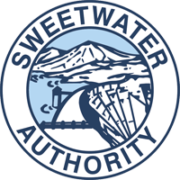Strategic Steps Minimize Water Rates for 2021
Following a public hearing, the San Diego County Water Authority’s Board of Directors today adopted rate increases for 2021 that are 30% lower than proposed last month following a series of refinements by staff. In addition, the Board directed staff to return in September or October with any further opportunities to reduce the 2021 rate increases, such as a decrease in rates set by the Metropolitan Water District of Southern California or the acquisition of federal or state economic stimulus funds.
As adopted June 25, the all-in rates charged to the Water Authority’s 24 member agencies will increase by 4.8% for untreated water and 4.9% for treated water in calendar year 2021. The new rates take effect January 1, 2021.
Rate increases are driven by reduced water sales, higher rates and charges from MWD and continued regional investments in supply reliability.
Secure water supply is foundation of economic recovery
Since the staff’s rate proposal was released in May, the Water Authority re-evaluated several assumptions driven by COVID-19 recessionary pressures based on new economic data and forecasts. The Water Authority also funded some costs related to the Carlsbad Desalination Plant this year instead of in 2021. The 2021 rates and charges may be further reduced if MWD makes material changes when revisiting its budget and rates this fall.
“We’ve taken a series of strategic steps to minimize rate impacts during this pandemic-induced recession, despite numerous factors putting upward pressure on rates,” said Water Authority Board Chair Jim Madaffer. “At the same time, the Water Authority is maintaining its long-term fiscal stability while ensuring a safe and reliable regional water supply for residents and businesses that will be the foundation of our economic recovery.”
In 2021, the Water Authority will charge its 24 member agencies an all-in municipal and industrial rate of $1,474 per acre-foot for untreated water, or $68 more per acre-foot than they currently pay. Charges would be $1,769 per acre-foot for treated water, or $83 more per acre-foot than in 2020.
Actual figures will vary by member agency, and each member agency will incorporate costs from the Water Authority into the retail rates it charges to residents, businesses and institutions. (Note: An acre-foot is about 325,900 gallons, enough to serve the annual needs of 2.5 typical four-person households in San Diego County.)
In addition, the rates package includes new Permanent Special Agriculture Water Rates, following the Board’s decision late last year to make the temporary program permanent. The program provides farmers with lower rates that correspond to a lower level of water supply reliability. In 2021, the untreated PSAWR will increase from its current level of $755 per acre-foot to $777 per acre-foot and the treated PSAWR will increase from $1,035 per acre-foot to $1,072 per acre-foot.
Rising costs from MWD affect rates
The fiscal pressures faced by the Water Authority include:
- Reduced water sales, which are 14% below the current budget and expected to remain low in 2021 due to coronavirus-related business closures and other factors. Decreased water sales put upward pressure on rates because costs must be spread across fewer units sold.
- Rising costs from MWD that reflect continued increases to its base supply rates and charges and the amount MWD charges to transport the Water Authority’s independent Colorado River supplies. For the Water Authority, MWD’s adopted 2021 rates increase supply costs by more than 9%, or $15.4 million.
The Water Authority’s 2021 rates were developed in conjunction with an independent cost-of-service study to ensure rates and charges comply with state law, legal requirements, cost-of-service standards and Board policies, and strategic tools such as the Long-Range Financing Plan.
In addition, the 2021 rates are designed to ensure Board-adopted debt coverage ratios that support the Water Authority’s strong credit ratings and minimize the cost of borrowing money for construction projects. The Water Authority has credit ratings of AAA with a stable outlook from S&P, AA+ from Fitch, and Aa2 with a stable outlook from Moody’s.
The rates adopted by the Board are the result of strategic measures that include:
- Providing more than $80 million in rate relief from the Rate Stabilization Fund over the next 24 months.
- Capitalizing on historically low interest rates and strong credit ratings by lowering annual debt expenditures by optimizing cash to restructure outstanding debt to provide significant savings.
- Planning to withdraw stored water to reduce water purchases while maintaining water reserves for future years – the result of careful planning and investments over more than two decades.
- Reducing budget expenditures with a hiring freeze reduced professional services contracts and reprioritizing more than $30 million in capital projects.


 Sweetwater Authority Logo 2019
Sweetwater Authority Logo 2019
